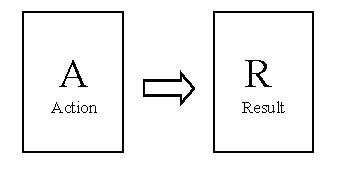 TRIZ
Textbooks: CID Course for Children, 1-1G6 TRIZ
Textbooks: CID Course for Children, 1-1G6 |
  
|
Topic 6.
What was in the past and what will be in the future?
(Changing
systems in time) |
Fairy Tales
School:
Course of Creative Imagination
Development (CID), 1st Grade, 1st Semester, Methodical Guide-Book |
Natalia
V. Rubina, 1999 [published
in Russian]
English
translation by Irina Dolina,
May 23, 2000
Technical
Editing by Toru Nakagawa, Feb.
28, 2001 |
Posted
in this "TRIZ Home Page in Japan" in English on Feb. 28, 2001 under the
permission of the Author.
(C) N.V. Rubina,
I. Dolina, and T. Nakagawa 2001 |
 |
Topic 6.
What was in the past and what will be in the future?
(Changing
systems in time) |
Workbook
Lesson 1.
The topic "Changing systems in
time " contains several mutually complementary directions.
First, acquaintance with a notion of
time. Very often 6-7 year olds do not understand well time ( yesterday-today-tomorrow;
next week, in a year; a minute, an hour, 2 lessons etc.). The class
with a topic "What was and what will be?" may help to transfer these notions
from abstract into more understandable.
Second, the systems change in time (a human
being grows, the water flows, the seasons change, a human being gets
to know the world) and these changes may be used in solving creative problems.
Third, the systems, created by a man, in
the course of time are improved by their creator. In this process
the creative problems arise solving which the man changes the world around
him.
For a first grade student it is quite enough
to apprehend and learn to use knowledge and skills of the first of the
above mentioned directions, and to get to know the second one (to solve
such problems it is too difficult for him so far).
1. Warming up
2. Homework check-up
3. Introduction to a lesson
It cannot come back
And there is no limits to it.
It cannot be stopped
Everything can live in it.
It will tell us when
Happiness or disaster occur,
When the birthday will come,
When the movement stops.
It can drag very slowly,
It can rush very fast.
It tells the people in different countries
When to switch on TV screen,
And even in a wild tribe
Everybody knows about ............
TODAY IS THE FIRST DAY
OF YOUR WHOLE FUTURE LIFE
TRY NOT TO LOSE IT!
4. Main topic
Today a new experience is awaiting you.
It is an experiment with time.
Sometimes it happens that time slows down
- the minutes, hours, days drag on. Or vice versa: "in
no time comes Christmas, then New Year..."
This is the task for the first
group:
(Any problem
will do, e.g., a riddle which can be solved in 5-7 minutes.)
- Second group has a more complicated
task. While the first group solving their problem you have to sit
very quietly, put everything aside and observe the silence.
Time has started.
And now the essence of our experiment.
Tell us, group 1, how much time has passed?
- One minute.
- Three minutes.
- And what do you think, group 2?
- Ten minutes.
- Five minutes.
- Fifteen minutes.
- Thank you. I have checked the
time, five minutes. But what is that? For group 1 the time
rushed, but for group 2 it was dragging very slowly. Why do you think
it is?
- Our riddle was very interesting, we
wanted to solve it as soon as possible, and we didn't notice how 5 minutes
passed.
- And when else time passes imperceptibly
?
- When you are out on a fine day.
- When you play on the computer.
- When you are involved in something
interesting.
- When you re reading an interesting
book.
- And what will say group 2?
- We were bored. I thought half
of the lesson has passed.
- Have you ever felt that the time goes
very slowly?
- When we have nothing to do.
- When you are waiting for something.
- When you are bored and there is nobody
to talk to.
- It seems that time has its own mysteries.


Draw a picture of how you are getting ready
for school in the morning.
The activities in this sketch can
be various:
- to perform any suggested situation;
- to offer to the kids to draw some action with mistakes and
then correct them;
- to cut a sketch in pieces and to move them and then restore
the course of events;
- and finally, performance of any kind of action, process
or event in the course of time breaking it into "stills" like steps of
developing the film. Next step is apprehensions of an interesting
method, created by I.N. Murashevska, that is making proverbs.
And now let's look attentively at our "film"
(how you are getting ready for school).
Looking at some of the "stills" I would say:
"Haste makes waste".
The wisdom of the people is concentrated in
the proverbs and sayings. Listen: "As a man sows, so shall he reap",
"Those who hope on heaven, stay without bread". And what proverbs
do you know?
The old people want very much to transfer their
experience to the younger ones. I advise you to listen attentively
to what your grandfathers and grandmothers, mothers and fathers say.
If you learn to listen attentively, you will find out a lot about
yourself, about people, about the world around you.
In the tales about hobbits by J.Tolkin one
of the wise elves said to a little hobbit: "People lived here before you,
and they will live here after you. The world is around us.
You may pay no attention to it but you are in it and it is in you".
Would you like to make proverbs yourself?
As a matter of fact in the proverbs the whole life of a man as it
is reflected. And we can make proverbs about our life. Let's
decide what a proverb consists of.
"Most haste - worst speed".
This proverb gives us an advice not to hurry
and to think carefully. So, if one is in a hurry to do something
nothing good will come of it. Here is a diagram:

"No matter how long the frog blows it will
not look like a bull".
- What is the frog doing?
- It is blowing itself.
- What is the result?
- It will not become scary.
- If there is an action in a proverb
it may be performed as a scene from a play. Lets perform in two acts.
Act 1: I imitate knitting.
Act 2: I show how comfortable and warm I am.
What proverb can you make?
"Those who can nit will never get frozen".
The kids perform their proverbs.
If the kids have difficulties in
making and acting out their proverbs, you may for the first time hand them
the notes with the proverbs. And they are only supposed to act them
out. When this stage is over, the kids can devise their own proverbs.
In the Card Index for the First Grade you will find proverbs to practice
in class.
Round the Clock
by Marina Vishnevetskaya
[Translation Note: Here is a verse of 27
lines, which is full of puns in Russian and cannot be translated directly
into English. Since the verse has no direct connection with the lesson,
its translation is postponed. The Author, N.V. Rubina, advises the
readers to select their own example.]
6. Activities on speech skills developing, producing a creative
product
This is a story happened on a winter day on the
playground. The mother let Lena go for a walk, but strictly demanded
that she should come home by the lunch-time, by 12 o'clock. Lena
rushed out of the house and ran to the snow fortress, that she was building
together with the crow Crack.
- Crack! - exclaimed Lena.- We
have been building this fortress for three day and for these three days
I was being late for lunch. It seems that this time I will be late
again. Because I don't have a watch...
The brave crow couldn't leave the girl without
help in trouble and flew somewhere right away. He came back
with his father's alarm-clock and a ski stick.
- Father has given me the alarm-clock
only for one day, - Crack said to Lena. - But with its help and this ski
stick we'll make our own sun-dial.
Crack drew a circle on the snow and in the
center of it he pushed the stick.
- The shade of this stick will be the
hand of our sun-dial, - said Crack and looked at his Father's clock.
It is nine o'clock sharp. So, we'll write 'nine' where the shade
falls on the ground.
The sun, moving in the sky from the
sunrise to the sunset, moved the shade from the stake. When the alarm-clock
showed ten o'clock Crack wrote number 'ten' where the shadow moved.
So during the day (with a lunch break, of
course) Crack and Lena drew the whole dial of their sun dial. But
part of the dial was not filled because it was the night part, when there
is no sun and Lena and Crack sleep at home.
- And what if the snow covers our figures?
- suggested Lena in alarm.
(Try to find out for yourselves what to do)
- Then we'll make next to every figure
a small snow or ice sculpture. - said Crack. - It'll take much time for
the snow to hide them.... Well, next to figure '9' we put a
sculpture of a bird, because birds wake up very early. Next to figure
'10' - a sculpture of a fox, next to '11' - a sculpture of a bear, next
to '12' -a sculpture of you, Lena because you have lunch at 12...
All the kids would come to see the snow fortress
with the sun dial and envy Lena and Crack. One doesn't have to...
Everybody can make such a clock. May be you'll try too.
This story is better to be told in
a form of problems that keep appearing and being solved. Of course,
it is fine if the problems are solved by the students themselves.
The story is compiled in such a way that the kids' experience is enough
to introduce an interesting solution.
7. Summing up
During summing up of this lesson
the kids' answers to the questions, such as "Is your birthday coming soon?",
"How long will the lesson continue?" and so on, might be very
illustrative.
[Translation Note: Lesson 2 of
this Topic is missing in the text. The Author's response to the Editor:
Topics 4 to 6 are given in a little abbreviated variant. They are
complemented by plays and problems in exhibit. I can send this exhibit
on E-mail if it is necessary. (Feb. 28, 2001)]
Last updated
on Feb. 28, 2001. Access point: Editor: nakagawa@utc.osaka-gu.ac.jp



